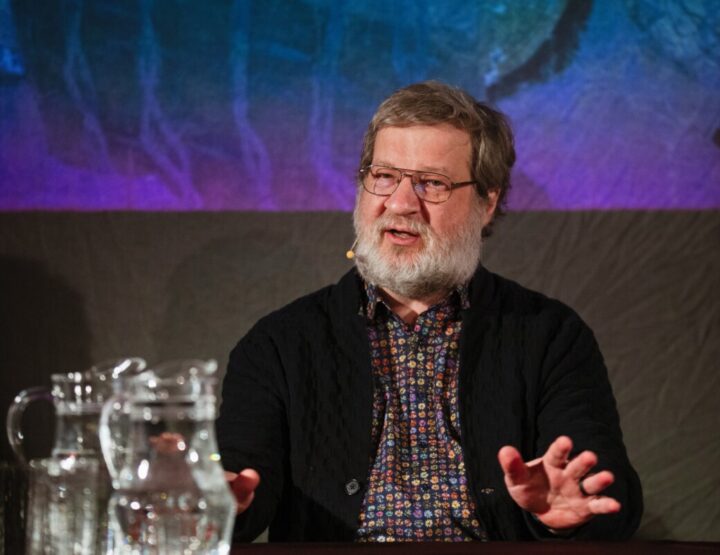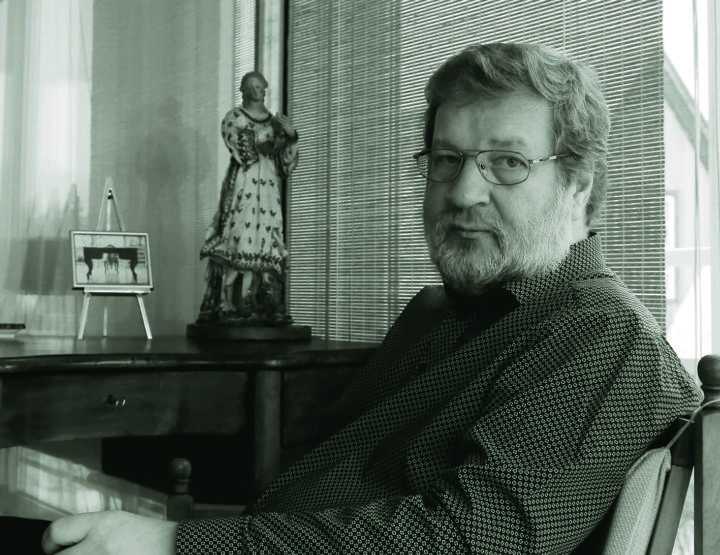Undivere Manor, North-Central Estonia. 1979.
Arno was left alone in the lounge of the sauna house. I suppose I should clean up a little, he reckoned. The cleaner will be here in just a few hours, of course, but it’s embarrassing: there are so many bottles. And I should at least stack the dishes in the sink, even if I don’t start washing them right away.
All of a sudden, he heard the loud hiss of a sizeable dose of water splashing over the red-hot rocks inside the sauna.
Now who could that be? he puzzled. He went into the shower room, knocked softly on the sauna door, and coughed discreetly.
“Mm-hmm, come right in,” a husky but musical woman’s voice drawled from inside.
Regardless, Arno didn’t open the door so as not to let out the steam.
“I thought everyone had left,” he said. “Or was asleep.”
“No, I’m still here,” the woman replied, as if it wasn’t already obvious. I guess she’s one of the chicks who came out here from Rakvere.
“Well, your crowd headed out already,” Arno said.
“Not a problem, I’ll make it somehow,” she called from inside. “Just a moment’s patience, I’m coming right out.”
She took her time. Arno sat down on a bench meanwhile and poured himself another little glass of vodka.
The woman then appeared in the doorway to the shower room, a large white terry towel wrapped tightly around her slender, damp body. The red hair that spilled over her shoulders was feathery and dry—she’d apparently had her head covered. The woman’s green eyes flashed vivaciously. But she appeared fairly older than those chicks: not quite Arno’s age just yet, but at least thirty, unlikely more: the lines hadn’t begun creeping onto her face just yet.
“Quite the modern-day sauna you have here,” the unexpected guest remarked, sitting down next to Arno.
“Thank you,” he nodded. “Can I pour you something?”
“I didn’t mean it as a compliment, I might add,” the woman continued, ignoring his offer. “At least not entirely. I approve of the endeavor, but the execution leaves quite a lot to be desired.”
“What do you mean?” Arno huffed. “It’s all tip-top, in my opinion.”
“Well, if it suits you, then all right,” the woman acquiesced. “Let’s talk about something else.”
She stared at Arno in a manner that made him feel uncomfortable.
“Er, well, I’m a married man, to tell the truth,” he said.
The woman laughed brightly.
“Oh, I don’t have that sort of interest in you at all, I want to discuss an entirely different matter.”
Arno was relieved, but a little injured, too.
“Well, truth be told, I was thinking we should probably wrap things up here,” he said. “Tomorrow’s another day and all. Should clean up a bit, on top of that.”
“Just a minute, I’ll help,” the woman promised. “I’m just going to catch my breath a bit here. I haven’t enjoyed a sauna like that in quite a long time.”
“I told you it’s tip-top,” Arno grinned.
“No, it certainly is in that respect.” She locked her piercing gaze on Arno again, as if weighing what he was worth. Her next words were much slower and slightly accented. “Actually… Actually, I’m interested in the manor house, rather. When are you going to get around to it?”
“What do you mean?” Arno asked.
“You are the boss here now,” the woman replied. “You do sit at that one large, cocoa-brown wooden desk with the curved legs, do you not?”
“I do,” Arno nodded, frowning. “How’d you know that?”
“But the roof is leaking into the attic in two places, and the windows have been boarded up in the wings.”
“Those are for storage,” Arno explained. “Some village kids kept throwing rocks at the windows and using ‘em for target practice all the time.”
“Storage,” the woman repeated, imitating Arno’s voice. “You really aren’t much of a visionary, I see. I do know that you care for this house. Very much so, even.”
“Well, yeah, ‘s true. So what?”
“Imagine what it would be like if it was renovated! Perhaps not exactly to the way it was back when von Dodecker built it, but to something along those lines? Say you haul all this useless junk away and let air and light in once again? Just like cleansing toxins from the blood—restored youth!”
“And what’m I to do with it then? A kolkhoz office is just a kolkhoz office: what we’ve got now’s fit for it, too.”
“No one is saying it has to remain a kolkhoz office forever,” the woman pointed out. “It would, for instance, be much better suited for a wedding venue. That, ah, what’s it called—office for domestic status contracts could be moved here, you know, and then it’d be possible to install a lovely kitchen and arrange nice celebrations for young couples. There would be a dance hall in the parlor, and the rooms could be fixed up, too, so the guests might be able to stay the night afterward. I reckon the entire district would want to start getting hitched here! And there’d be new life breathed into the house, people’s romances and hopes and yearnings would collect here; not numbers and guidelines and the rest of that red crap… Excuse me.”
Arno grunted. “But I’ve still got to put all that, as you say, red crap somewhere, you know.”
“It won’t take up all that much space, I assure you. Most of the building is standing completely empty, as it is. There’s that, ah, executive committee headquarters being built in the village right now: it’s enormously bigger than what they really need, you know. You’ll talk things through with the chairman of the village soviet; no doubt they’ll find space for your kolkhoz office as well. And things will be much easier that way, in general: people will be able to take care of all their official business in one place. It’s quite a ways to get out here, especially for some of the more elderly folk.”
To be fair, what she proposed did sound quite reasonable. But what it all had to do with that woman: that, he couldn’t figure out.
“What’s more, you’re not the only one around here who’s capable of thinking big, you know,” the woman continued. “Just look at what your colleagues are up to. What Erilt has undertaken in Rägavere. Or Nõmm in Sagadi. Miller in Kardse. Epner in Palmse. You’re no less of a man than any of them, now are you?”
Her green eyes bored straight through him. In truth, the woman had hit a soft spot: quite often, he’d walked around that manor house as it silently and sadly looked on his daily activities, and had tried to imagine how life might have looked there before. He would touch an old but dutiful doorknob, and wondered about the people whose hands had held it, likewise. He’d attempted to reach behind the heavy veil that had settled over his surroundings with the passing of time. He wasn’t here as the heir of its former glory—he was well aware of that—but neither was he here as a guest.
Even so, up until now, the thought of pulling up his bootstraps and sweeping the veil away hadn’t crossed his mind.
On the other hand, he did have a sense of enterprise.
“Of course you do,” the woman encouraged. “I wouldn’t be speaking if you didn’t.”
“I won’t be able to manage it all by my lonesome,” Arno said. “I’ll need specialists here who know about all that old stuff: it is much easier to ruin something than to make it whole.”
“Well, and why do you think I’m here?” The woman appeared almost offended, although she hadn’t actually told Arno anything about who she was or where she’d come from. “Why’d I even show up in the first place?” Her eyes blazed. “So, what’s it going to be: are we going to do it?”
“Fine, fine,” Arno agreed, since not one other idea could seem more natural to him at that moment. “Let’s do it.”
“But it’ll be hard work. And once you start, you mustn’t go back on your word. You have to promise me that.”
“I promise.”
“Good.” The woman nodded and stood. “We’ll meet again. Regularly.” She walked over to the front door, waved over her shoulder, then suddenly flung the towel in Arno’s direction, stepped outside naked, and pulled the door shut behind her.





